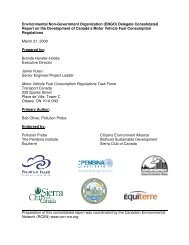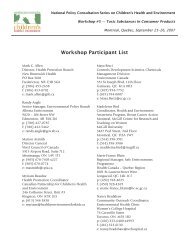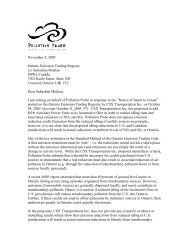Primer on Bioproducts - BIOCAP Canada
Primer on Bioproducts - BIOCAP Canada
Primer on Bioproducts - BIOCAP Canada
You also want an ePaper? Increase the reach of your titles
YUMPU automatically turns print PDFs into web optimized ePapers that Google loves.
Biological Sensors for Food and SecurityMilli<strong>on</strong>s of Canadians become ill from food pois<strong>on</strong>ing each year,and perhaps hundreds die from bacterial pathogens, such asEscherichia coli and Salm<strong>on</strong>ella. Increasingly, the food processingindustry is looking to biology to provide early warning systemsthat can signal the presence of food pathogens. In general, thesystems work by using the natural protein antibodies producedby living things in resp<strong>on</strong>se to the toxins (antigens) generated byinvading micro-organisms. The antibodies are arranged in apattern; when the antibody “key” fits the pathogen’s antigen“lock,” the pattern or colour automatically betrays the presence ofthe bacteria. These same techniques are also being developed forearly detecti<strong>on</strong> of polluti<strong>on</strong> and for defence against biological andchemical weap<strong>on</strong>s.In some cases, DNA from pathogens and other organisms isincorporated into microscopic detecti<strong>on</strong> machines known as“gene chips.” Gene chips combine what is known about thebiology of DNA with nanotechnology and informati<strong>on</strong>technology to produce a tiny laboratory slide that automaticallysignals to a computer when the genes are turned “<strong>on</strong>” or “off.” Aswith the genetic modificati<strong>on</strong> of bacteria, gene chips allow forinstantaneous detecti<strong>on</strong> of pathogens, toxic chemicals and otherharmful substances.Bacteria Sniff OutLandminesThere are an estimated 60–70milli<strong>on</strong> landmines buried in thefields and forests of more than 60countries worldwide. According tothe Internati<strong>on</strong>al Committee of theRed Cross, these mines injure or killapproximately 26,000 civiliansevery year. A few years ago, expertsfound a microscopic ally in theirbattle to rid the world of landmines.The bacterium, Pseudom<strong>on</strong>asputida, was found to have a naturalsensitivity to trinitrotoluene — thewell-known TNT used in explosives.Through transgenic engineering,scientists have genetically modifiedthe bacterium so that it producesthe same protein that jellyfish useto glow fluorescent green. Thejellyfish protein is stimulated whenthe bacterium detects the presenceof TNT. This modified, explosivesensitivebacterium has alreadybeen shown to be very effective indetecting landmines.PRIMER ON BIOPRODUCTS43
















